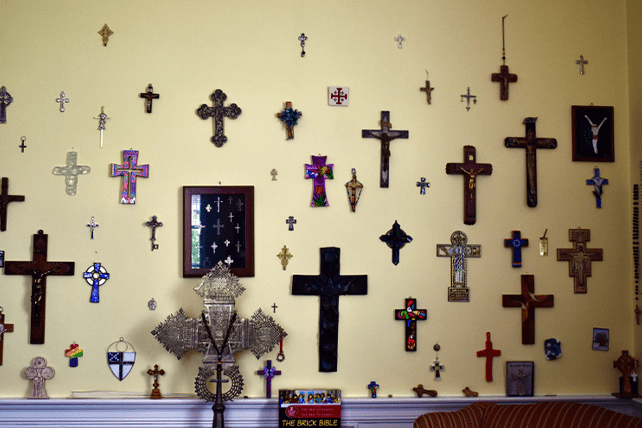(RNS) — A group of Christian denominations and organizations filed a lawsuit on Monday (July 28) against Secretary of Homeland Security Kristi Noem over the Trump administration’s decision to rescind a policy discouraging immigration raids at houses of worship, the fourth such suit to be brought on the question of arrests made at so-called “sensitive locations.”
In the past, immigration enforcement actions at churches were discouraged by a 2011 internal government memo that advised against raids at sensitive locations, such as houses of worship, schools and hospitals. But Trump did away with the policy shortly after taking office, which faith groups argue in their suit “is not just harmful and un-American” but also “violates federal law,” citing both freedom of assembly guaranteed under the First Amendment as well as rights outlined by the Religious Freedom Restoration Act and the Administrative Procedure Act.
“For Plaintiffs and their members, the present threat of surveillance, interrogation, or arrest at their houses of worship means, among other things, fewer congregants participating in communal worship; a diminished ability to provide or participate in religious ministries; and interference with their ability to fulfill their religious mandates, including their obligations to welcome all comers to worship and not to put any person in harm’s way,” the complaint reads.
The plaintiffs include five regional synods of the Evangelical Lutheran Church in America and three regional Quaker groups. Three Christian denominations are also listed: American Baptist Churches USA, Alliance of Baptists and Metropolitan Community Churches. They are represented by progressive legal groups Democracy Forward, Washington Lawyers’ Committee for Civil Rights and Urban Affairs and the Washington law firm Gilbert LLP.
“As people of faith, we cannot abide losing the basic right to provide care and compassion,” Bishop Brenda Bos of the ELCA’s Southwest California Synod said in a statement. “Not only are our spaces no longer guaranteed safety, but our worship services, educational events and social services have all been harmed by the rescission of sensitive space protection. Our call is love our neighbor, and we have been denied the ability to live out that call.”
Asked about the lawsuit, Assistant Homeland Security Secretary Tricia McLaughlin told Religion News Service in a statement: “We are protecting our schools, places of worship by preventing criminal aliens and gang members from exploiting these locations and taking safe haven there because these criminals knew law enforcement couldn’t go inside under the Biden Administration.”
DHS did not immediately respond to a followup question asking to specify an example of a gang member taking refuge in a church under the previous administration, but the initial statement insisted raids on sensitive locations require special protocols before being carried out.
“Officers would need secondary supervisor approval before any action can be taken in locations such as a church or a school,” McLaughlin said in the statement, adding, “We expect these to be extremely rare.”
In a separate interview with RNS, Bos rejected McLaughlin’s characterization of those targeted by recent immigration enforcement actions, which the government’s own data has indicated are often — and in some cases, mostly — people without criminal convictions.
“What we’re looking at is folks that have been deeply embedded in the communities and in their congregations, real people of faith and service who are being harmed,” Bos said. “I don’t have a lot of patience for this administration painting everybody with a criminal brush.”
Even acknowledging enforcement actions at churches is a shift for the Trump administration, which has repeatedly insisted immigration raids haven’t taken place at any houses of worship. McLaughlin told The Washington Post earlier this month, “Immigration enforcement operations haven’t been conducted at churches or places of worship.” In addition, conservative outlet Daily Wire quoted Trump border czar Tom Homan on July 9 saying he did “not know of a single incident of a church arrest.”

